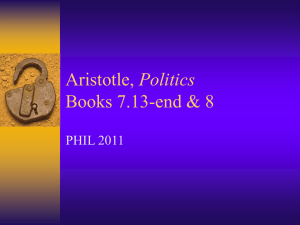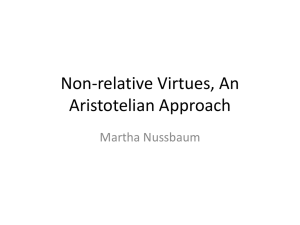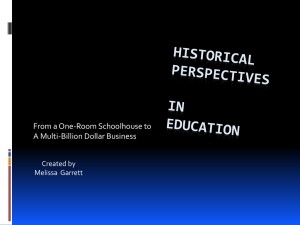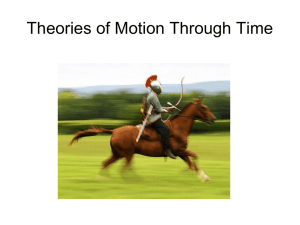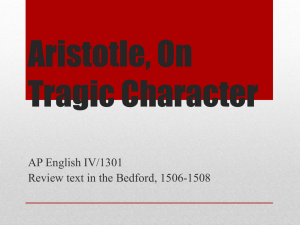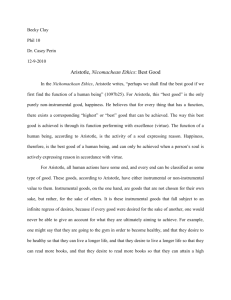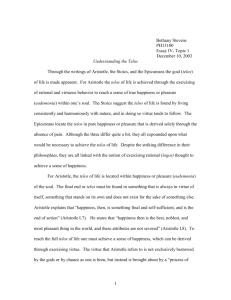Reading 15
advertisement
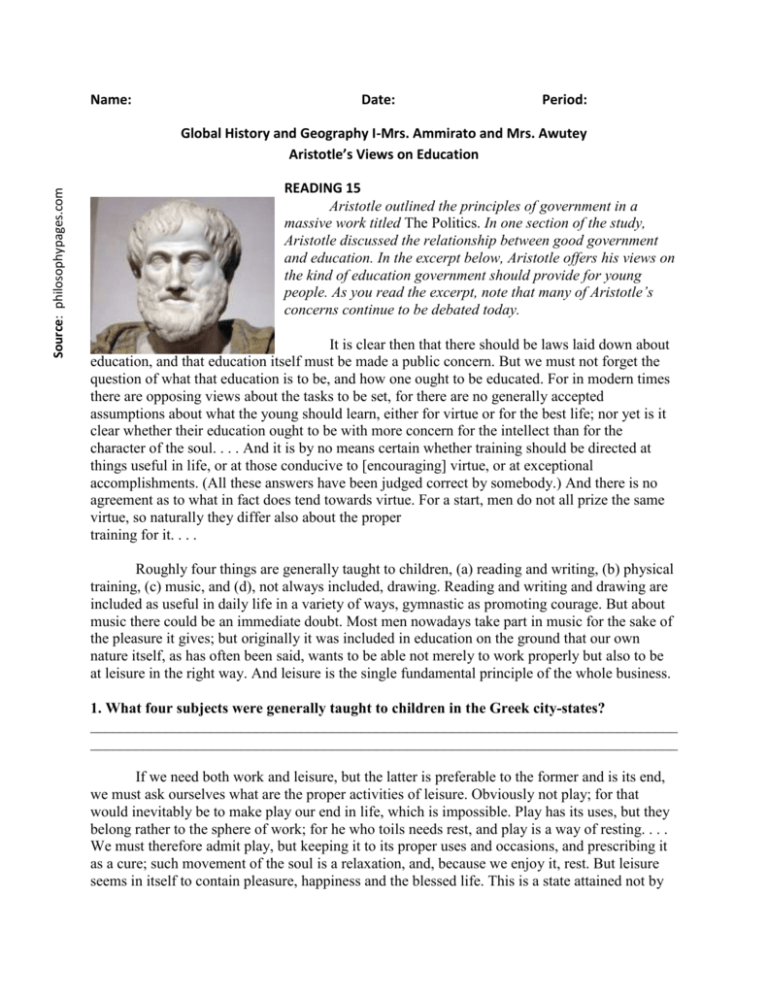
Name: Date: Period: Source: philosophypages.com Global History and Geography I-Mrs. Ammirato and Mrs. Awutey Aristotle’s Views on Education READING 15 Aristotle outlined the principles of government in a massive work titled The Politics. In one section of the study, Aristotle discussed the relationship between good government and education. In the excerpt below, Aristotle offers his views on the kind of education government should provide for young people. As you read the excerpt, note that many of Aristotle’s concerns continue to be debated today. It is clear then that there should be laws laid down about education, and that education itself must be made a public concern. But we must not forget the question of what that education is to be, and how one ought to be educated. For in modern times there are opposing views about the tasks to be set, for there are no generally accepted assumptions about what the young should learn, either for virtue or for the best life; nor yet is it clear whether their education ought to be with more concern for the intellect than for the character of the soul. . . . And it is by no means certain whether training should be directed at things useful in life, or at those conducive to [encouraging] virtue, or at exceptional accomplishments. (All these answers have been judged correct by somebody.) And there is no agreement as to what in fact does tend towards virtue. For a start, men do not all prize the same virtue, so naturally they differ also about the proper training for it. . . . Roughly four things are generally taught to children, (a) reading and writing, (b) physical training, (c) music, and (d), not always included, drawing. Reading and writing and drawing are included as useful in daily life in a variety of ways, gymnastic as promoting courage. But about music there could be an immediate doubt. Most men nowadays take part in music for the sake of the pleasure it gives; but originally it was included in education on the ground that our own nature itself, as has often been said, wants to be able not merely to work properly but also to be at leisure in the right way. And leisure is the single fundamental principle of the whole business. 1. What four subjects were generally taught to children in the Greek city-states? ______________________________________________________________________________ ______________________________________________________________________________ If we need both work and leisure, but the latter is preferable to the former and is its end, we must ask ourselves what are the proper activities of leisure. Obviously not play; for that would inevitably be to make play our end in life, which is impossible. Play has its uses, but they belong rather to the sphere of work; for he who toils needs rest, and play is a way of resting. . . . We must therefore admit play, but keeping it to its proper uses and occasions, and prescribing it as a cure; such movement of the soul is a relaxation, and, because we enjoy it, rest. But leisure seems in itself to contain pleasure, happiness and the blessed life. This is a state attained not by those at work but by those at leisure, because he that is working is working for some hitherto unattained end, and happiness is an end, happiness which is universally regarded as concomitant [associated] not with pain but with pleasure. Admittedly men do not agree as to what that pleasure is; each man decides for himself following his own disposition. . . . Thus it becomes clear that, in order to spend leisure in civilized pursuits, we do require a certain amount of learning and education, and that these branches of education and these subjects studied must have their own intrinsic [essential] purpose, as distinct from those necessary occupational subjects which are studied for reasons beyond themselves. Hence, in the past, men laid down music as part of education, not as being necessary, . . . nor yet as being useful in the way that a knowledge of reading and writing is useful for business or household administration, for study, and for many of the activities of a citizen, nor as a knowledge of drawing seems useful for the better judging of the products of a skilled worker, nor again as gymnastic is useful for health and vigour—neither of which do we see gained as a result of music. There remains one purpose— for civilized pursuits during leisure; and that is clearly the reason why they do introduce it, for they give it a place in what they regard as the civilized pursuits of free men. . . . 2. According to Aristotle, why did the Greeks’ ancestors make music a part of education? ______________________________________________________________________________ ______________________________________________________________________________ Clearly then there is a form of education which we must provide for our sons, not as being useful or essential but elevated and worthy of free men. . . . It is also clear that there are some useful things, too, in which the young must be educated, not only because they are useful (for example they must learn reading and writing), but also because they are often the means to learning yet further subjects. Similarly they must learn drawing, not for the sake of avoiding mistakes in private purchases, and so that they may not be taken in when buying and selling furniture, but rather because it teaches one to be observant of physical beauty. 3. What points about education raised by Aristotle are still debated today? ______________________________________________________________________________ ______________________________________________________________________________ From The Politics by Aristotle, translated by T. A. Sinclair, revised by Trevor J. Saunders. Translation copyright © 1962 by the Estate of T. A. Sinclair; revised translation copyright © 1981 by Trevor J. Saunders. Published by Penguin Classics, Revised Edition, 1981.


